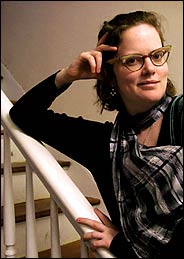 The following is excerpted from Slate magazine, December 23, 2005.
The following is excerpted from Slate magazine, December 23, 2005.
The Gospels don't preach family values.
An old-fashioned family Christmas?
Anticipating the holiday, I've set up six small crèche scenes, clay and porcelain re-creations of the Holy Family, throughout my house.
And I'll be traveling to spend Christmas with family in Georgia. The centrality of family to the holiday has prompted several prominent megachurches to close their doors this Christmas Sunday. These churches argue that since their members generally prefer to spend the morning of the holiday around a tree with their loved ones, there's no point in holding services. (Some churches have never held big Christmas morning services, but no one really cared because the holiday fell on a weekday. The fuss this year is over canceling regular Sunday services.)
Critics have denounced the closings, saying that the megachurches-which are supposed to know the "reason for the season"-are caving to a secular vision of Christmas, one that is more about Santa Claus than Jesus Christ. But the real problem is that the megachurches' "family-friendly" decision enshrines a notion of the family that Jesus would never have gone for. Christmas is the day on which we celebrate the birth of Jesus to his human family and also the holiday that ought to reorder our understanding of what family is. Though you might not know it from your local Christian radio station, a basic insight of the Gospels is that biological family, nuclear family, is not the most important institution.
AdvertisementWhile we're singing about peace on earth and good will to men, it is worth remembering that in the Gospel of Matthew, Jesus declared: "Do not suppose that I have come to bring peace to the earth. I did not come to bring peace, but a sword." Then, quoting the prophet Micah, he intoned:
For I have come to turn "a man against his father, a daughter against her mother, a daughter-in-law against her mother-in-law-a man's enemies will be the members of his own household." Anyone who loves his father or mother more than me is not worthy of me; anyone who loves his son or daughter more than me is not worthy of me.
For both Romans and Jews, familial duty was sacred. Yet Jesus instructs a recently bereaved son to forgo the obligation of burying his father in order to "go and proclaim the kingdom of God." He tells a group of Sadducees that there will be no marriage in heaven. He announces to a crowd of followers that "If anyone comes to me and does not hate his father and mother, his wife and children, his brothers and sisters-yes, even his own life-he cannot be my disciple." This is not the stuff of "family values."
This is not to say that Jesus was anti-family. Many of his teachings offer blunt rebuke to a casual treatment of family bonds: He insisted that, except in the direst circumstances, marriage ought not end in divorce. "What God hath joined together, let no man put asunder" is a direct quote. And, in a culture that viewed children as possessing little value and fewer rights, Jesus was exquisitely devoted to children, saying that adults have to become like them if they want to enter the kingdom of heaven.
But Jesus supported the family only after redefining it. He didn't care whose child or parent you were; he cared that you were his followers' brother or sister in Christ. We can see this most clearly and most startlingly in Jesus' interactions his own mother, Mary. When I look at the crèche scenes scattered all over my house, I'm tempted to remember Mary only as Jesus' mom. She was that, of course, and the Virgin birth is no small thing. (Click here for more on Jesus' birth.) But in the Gospel of Mark, we see that Mary is Jesus' disciple before she is his mother. Jesus is out and about, teaching in parables. People gather around him, but they don't know what to think-some say he's crazy; others think he might be possessed by an evil spirit. Mary and Jesus' brothers come to see him, perhaps to protect and take care of him. When some of his disciples tell Jesus that his family is outside looking for him, he responds, "Who are my mother and my brothers?" Then, looking at his followers, Jesus declares, "Here are my mother and my brothers! Whoever does God's will is my brother and sister and mother."
Mary, of course, makes the cut-in the Christian tradition, she is held up as a woman who, by submitting to Jesus' miraculous conception, supremely did God's will. But in the new kingdom that Jesus inaugurates, Mary's relationship with Jesus is defined by her membership in the community that becomes his church. Jesus makes the point again at the very end of his life. On the cross, he points to a disciple and then says to Mary, "Dear woman, here is your son," and to the disciple says, "Here is your mother."
This understanding of family is at the root of the ritual of baptism. Addressing his readers as his children and his brothers, Paul suggests that the essence of baptism is an adoption into a new family, in which the waters of baptism run thicker than blood ties. As the contemporary ethicist Julie Hanlon Rubio has argued in A Christian Theology of Marriage and Family, Jesus called his followers to create a society in which people shared their property and didn't lord power over each other-a great early experiment in collectivism. "A radical rejection of the traditional family was necessary," Rubio writes, to create a community of believers who put following Jesus above all else.
As a Christian, then, my real family consists of fellow followers of Jesus, whether or not they are blood kin. Which is why I will be spending Christmas, yes, with my husband and nieces and nephews and in-laws, but also, unlike the good folks at Willow Creek, in church, with all of my brothers and sisters in Christ.
http://www.slate.com/articles/life/faithbased/2005/12/who_are_my_mother_and_my_brothers.html
The following bio is taken from her website...
http://www.laurenwinner.net/bio.html
Lauren F. Winner is the author of numerous books, including Girl Meets God and Mudhouse Sabbath. Her study A Cheerful & Comfortable Faith: Anglican Religious Practice in the Elite Households of Eighteenth-Century Virginia will be published in the fall of 2010 from Yale University Press. She has appeared on PBS's Religion & Ethics Newsweekly and has written for The New York Times Book Review, The Washington Post Book World, Publishers Weekly, Books and Culture, and Christianity Today. Winner has degrees from Duke, Columbia, and Cambridge universities, and holds a Ph.D. in history. The former book editor for Beliefnet, Lauren teaches at Duke Divinity School, and lives in Durham, North Carolina. Lauren travels extensively to lecture and teach. During the academic year of 2007-2008, she was a visiting fellow at the Center for the Study of Religion at Princeton University, and during the academic year of 2010-2011, she will be a visiting fellow at the Institute of Sacred Music at Yale University. When she's home, you can usually find her curled up, on her couch or screen porch, with a good novel.
















